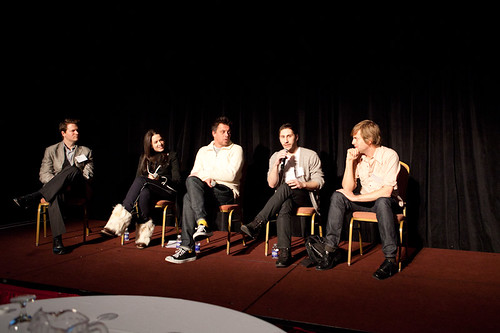Publishing isn’t broken, or so says Jane Smith over at How Publishing Really Works, and here’s why. The very best books from the very best writers get published; books get sold; and writers, agents, editors, publishers, etc. get what they want: money. Phew. Good to have that sorted out so tidily. Unless, of course, it’s not really that tidy…
For decades, the publishing business has worked pretty well. Writers write books; agents sell those books to publishers; publishers make the books available to the market. Money flows through the system from reader to writer via the publisher and agent. Everyone involved makes money, and gets what they want… Be very wary of new models of publishing. The old one works just fine. (A New Model for Publishing?)
Smith suggests that the only breakdown in the publishing world is unskilled writers, agents, etc. Granted, there’s plenty of room to point the finger at unqualified contenders, that’s always fun and easy. But it seems that Smith is overlooking vital current concerns about whether or not the traditional publishing environment is broken, outdated, inefficient, etc. She talks a lot about money in traditional book publishing. This makes sense because the Gutenberg Paradigm is expensive to maintain. Whereas evolutions in technology, book selling, and readers’ habits have enabled modern publishing alternatives that make book publishing less expensive. Much less expensive!
Mainstream publishing isn’t broken: it has its flaws, certainly, but it still works. It still publishes books which show clear commercial potential; works to make those books as good as they can possibly be; and then gets those books into as many sales points as it possibly can. Just because it does that by only publishing the very best books from the very best writers, and consequently rejecting the majority, doesn’t mean that it’s broken: just that far too many writers are not yet good enough at their craft for publishers to risk investing their money in them.(Publishing Isn’t Broken)
Correct, rejecting the majority does not mean traditional publishing is broken. Correct, many writers undoubtedly are not worthwhile investments for traditional publishers, either because they are not sufficiently skilled writers or because there isn’t a big enough market for what they write. But this fulcrum of commercial potential is dramatically shifted when we consider the modern publishing industry’s efficiencies. Digitally distributed ebooks cut significant time and cost out of production and distribution. Print on demand (
POD) publishing dramatically reduces up-front costs for book publishing. And these are just two cost cutting shifts that favor new models of publishing over traditional models of publishing. And less invested in a new title means less risk of failure and a lower ROI threshold. It means that the market can be used to evaluate the viability of a new book rather than a committee, an editor, even an agent. This means more variety and risk is possible for new books. It means niche markets become far more viable than they were in traditional publishing.This is hugely exciting!
Publishing cannot focus solely on bringing works of staggering genius to the attention of a grateful reading public, or on nurturing and supporting novice writers as they learn their craft and experiment with exciting risky new projects: while that would be nice for those novice writers it wouldn’t be nearly so nice for the publishers’ shareholders who would have to provide funds to publish the many turkeys such an approach would undoubtedly hatch, nor would readers appreciate being provided with all the unreadable tripe which might well result… [So] publishing books which will sell well has to be the publishing business’s main focus. (Publishing: Broken Or Not?)
Broken or not, Smith highlights one of the biggest challenges that traditional publishers face today: the economics are changing. The old way no longer
works just fine. “
Re-imagine the future,” Debbie Stier says. “
Forget the old way. It doesn’t work in the new economy. Stop trying to control; make something useful and help people use it; get out of the way.” Amen. I’m anticipating a publishing industry that will be far more agile, flexible and stripped down. Far less costly to sustain. Far more in sync with readers, writers and consumer habits.
Like this:
Like Loading...






